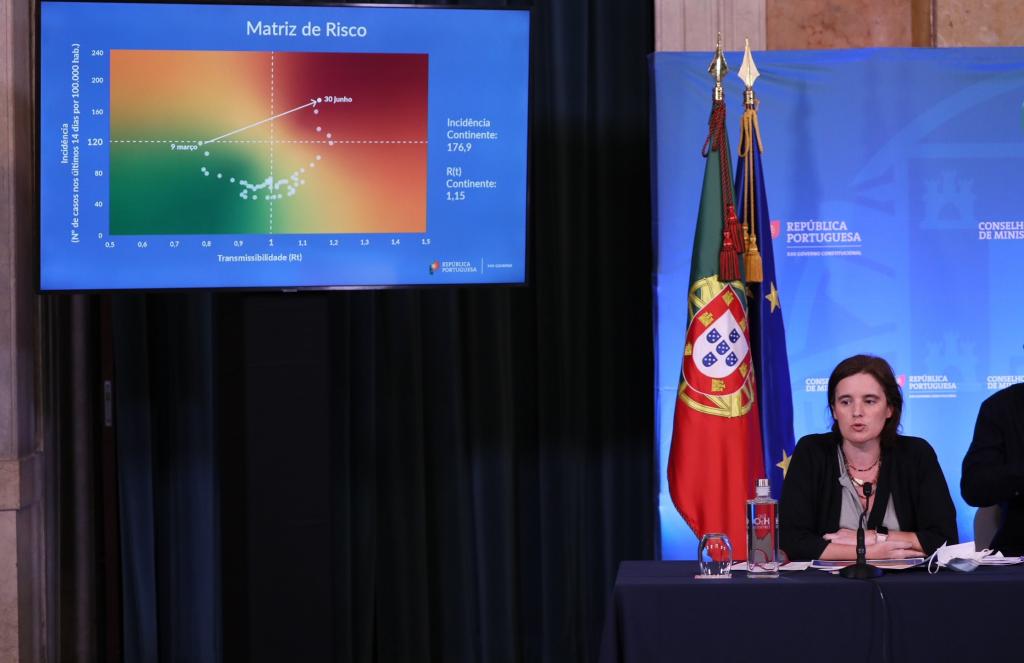Thessaloniki gets ready for its metro launch in November
The underground rapid transit lines have been under construction for almost two decades due to various project delays
 TheMayor.EU logo
TheMayor.EU logo 
Mariana Vieira da Silva, Portuguese Minister of State, announcing the measures at a press conference, Source: Government of Portugal
This time the measures will spread over 45 municipalities in the country
Another bleak weekend is in the works for Portugal after Covid-19 cases, linked to the Delta variant, continued to rise in the country. The new cases seem to be especially prominent among younger and non-vaccinated people. As a result, the National Government has decided to impose a night curfew between the hours of 11:00 pm and 5:00 am in 45 municipalities.
Since the start of the pandemic, Portugal has recorded 17,101 deaths and 882,002 cases according to official data. 2,000 new infections were added on the last day of June.
"We are not in a position to consider the pandemic under control and I appeal to everyone to continue to comply with the rules and avoid risky behaviour," stated the Minister of State and Presidency, Mariana Vieira da Silva. She underlined that "in the last week the situation deteriorated again" and that "the Mainland currently has an incidence factor of 176.9 and an R number of 1.15, the R being lower than last week, but the incidence being the highest'.
The Minister of State reported that the incidence was elevated in all groups under the age of 34, meaning that the Delta variant did not discriminate per age. The other risky group were people who have not yet received a vaccine.
Last week, only 3 municipalities were considered to be ‘very high risk’ – this week their number has jumped to 19. That means that these are places where 240 or more cases per 100 thousand inhabitants have been recorded.
In these, in addition to limiting circulation on the public road between 11:00 pm and 5:00 am, more rules apply. These are: mandatory teleworking (whenever the functions allow it); cultural shows close at 10:30 pm; gyms operate without group classes; no high-risk sports; weddings and baptisms have a maximum capacity of 25%; the restaurants, cafes and patisseries, will stay open until 10:30 pm during the week, and until 3:30 pm at the weekend and on public holidays, with a maximum of 4 people per group inside and 6 people per group on the terrace; retail trade is open until 9 pm on weekdays and until 7:00 pm on weekends and holidays.
In the 26 'high risk' municipalities, there are similar measures with regards to curfew, but the number of people who can attend restaurants is higher (6 in the interior, 10 on the terraces) and retail trade will close at 9:00 pm every day. Also, there is no mention of limitations on sports activities.
The authorities will likely also speed up vaccination efforts. So far, more than 50% of the population has received one dose and 32% - two doses.
Here is a detailed list of the 'very high risk' municipalities: Albufeira, Almada, Amadora, Barreiro, Cascais, Constância, Lisbon, Loulé, Loures, Mafra, Mira, Moita, Odivelas , Oeiras, Olhão, Seixal, Sesimbra, Sintra, and Sobral de Monte Agraço.
As for the 'high risk' ones, these are: Alcochete, Alenquer, Arruda dos Vinhos, Aviz, Braga, Castelo de Vide, Faro, Grândola, Lagoa, Lagos, Montijo, Odemira, Palmela, Paredes de Coura, Portimão, Porto, Rio Maior, Santarém, São Brás de Alportel, Sardoal, Setúbal, Silves, Sines, Sousel, Torres Vedras and Vila Franca de Xira.
If you want to keep up with how European cities and regions are changing, follow us on Facebook, Twitter and Instagram.

The underground rapid transit lines have been under construction for almost two decades due to various project delays

Now you can get your wine in Talence by paying directly in Bitcoin

That’s because the state has to spend money on updating the railway infrastructure rather than subsidizing the cost of the popular pass

Rethinking renewable energy sources for the urban landscape

The examples, compiled by Beyond Fossil Fuels, can inform and inspire communities and entrepreneurs that still feel trepidation at the prospect of energy transition

Now you can get your wine in Talence by paying directly in Bitcoin

The 10th European Conference on Sustainable Cities and Towns (ESCT) sets the stage for stronger cooperation between the EU, national and local level to fast track Europe's transition to climate neutrality.

At least, that’s the promise made by the mayor of Paris, Anne Hidalgo

The underground rapid transit lines have been under construction for almost two decades due to various project delays

At least, that’s the promise made by the mayor of Paris, Anne Hidalgo

Hostal de Pinós is located in the geographical centre of the autonomous region

Despite its church-y name, the district has long been known as the hangout spot for the artsy crowds

Urban dwellers across the EU are having a say in making their surroundings friendlier to people and the environment.

Forests in the EU can help green the European construction industry and bolster a continent-wide push for architectural improvements.

Apply by 10 November and do your part for the transformation of European public spaces

An interview with the Mayor of a Polish city that seeks to reinvent itself

An interview with the newly elected ICLEI President and Mayor of Malmö

A conversation with the Mayor of Lisbon about the spirit and dimensions of innovation present in the Portuguese capital














